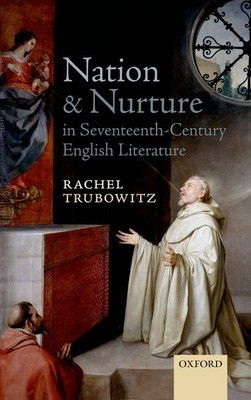
- We will send in 10–14 business days.
- Author: Rachel Trubowitz
- Publisher: Oxford University Press (UK)
- ISBN-10: 0199604738
- ISBN-13: 9780199604739
- Format: 13.7 x 21.3 x 1.8 cm, kieti viršeliai
- Language: English
- SAVE -10% with code: EXTRA
Nation and Nurture in Seventeenth-Century English Literature (e-book) (used book) | bookbook.eu
Reviews
Description
Nation and Nurture in Seventeenth-Century English Literature connects changing seventeenth-century English views of maternal nurture to the rise of the modern nation, especially between 163 and 1675. Maternal nurture gains new prominence in the early modern cultural imagination at the precise moment when England undergoes a major paradigm shift - from the traditional, dynastic body politic, organized by organic bonds, to the post-dynastic, modern nation, comprised of symbolic and affective relations. The book also demonstrates that shifting early modern perspectives on Judeo-Christian relations deeply inform the period's interlocking reassessments of maternal nurture and the nation, especially in the case of Milton. The book's five chapters analyze a wide range of reformed and traditional texts, including A pitiless Mother, William Gouge's Of Domesticall Duties, Shakespeare's Macbeth, Charles I's Eikon Basilike, and Milton's Paradise Lost, and Samson Agonistes. Equal attention is paid to such early modern visual images as The power of women (a late sixteenth-century Dutch engraving), William Marshall's engraved frontispiece to Richard Braithwaite's The English Gentleman and Gentlewoman (1641), and Peter Paul Rubens's painting of Pero and Cimon or Roman Charity (163). The book argues that competing early modern figurations of the nurturing mother mediate in politically implicated ways between customary biblical models of English kingship and innovative Hebraic/Puritan paradigms of Englishness.
EXTRA 10 % discount with code: EXTRA
The promotion ends in 21d.04:40:58
The discount code is valid when purchasing from 10 €. Discounts do not stack.
- Author: Rachel Trubowitz
- Publisher: Oxford University Press (UK)
- ISBN-10: 0199604738
- ISBN-13: 9780199604739
- Format: 13.7 x 21.3 x 1.8 cm, kieti viršeliai
- Language: English English
Nation and Nurture in Seventeenth-Century English Literature connects changing seventeenth-century English views of maternal nurture to the rise of the modern nation, especially between 163 and 1675. Maternal nurture gains new prominence in the early modern cultural imagination at the precise moment when England undergoes a major paradigm shift - from the traditional, dynastic body politic, organized by organic bonds, to the post-dynastic, modern nation, comprised of symbolic and affective relations. The book also demonstrates that shifting early modern perspectives on Judeo-Christian relations deeply inform the period's interlocking reassessments of maternal nurture and the nation, especially in the case of Milton. The book's five chapters analyze a wide range of reformed and traditional texts, including A pitiless Mother, William Gouge's Of Domesticall Duties, Shakespeare's Macbeth, Charles I's Eikon Basilike, and Milton's Paradise Lost, and Samson Agonistes. Equal attention is paid to such early modern visual images as The power of women (a late sixteenth-century Dutch engraving), William Marshall's engraved frontispiece to Richard Braithwaite's The English Gentleman and Gentlewoman (1641), and Peter Paul Rubens's painting of Pero and Cimon or Roman Charity (163). The book argues that competing early modern figurations of the nurturing mother mediate in politically implicated ways between customary biblical models of English kingship and innovative Hebraic/Puritan paradigms of Englishness.


Reviews